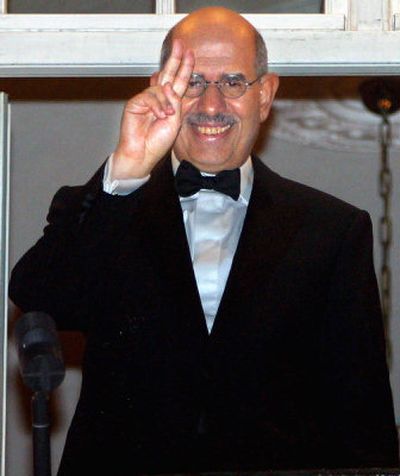Nuclear risks high, says Nobel winner

OSLO, Norway – Fifteen years after the end of the Cold War, the risk of nuclear disaster is as great as ever, with terrorists zealously pursuing atomic weapons, chief U.N. nuclear inspector Mohamed ElBaradei said Saturday in accepting the 2005 Nobel Peace Prize.
ElBaradei and the International Atomic Energy Agency he leads received the coveted award in the Norwegian capital for their efforts to control the spread of nuclear weapons – a job ElBaradei nearly lost because of a dispute with the United States over Iran and Iraq.
“We are in a race against time,” the 63-year-old Egyptian said about efforts to keep nuclear weapons away from terrorists. “In four years, we have completed perhaps 50 percent of the work. But this is not fast enough.”
To escape self-destruction, the world must make atomic weapons as much of a taboo as slavery or genocide, ElBaradei said in his acceptance speech. It has been 60 years since the 1945 atomic bombings of Hiroshima and Nagasaki in Japan, yet the world is still deeply concerned over nuclear programs in Iran and North Korea.
The Bush administration has bristled at ElBaradei’s positions on the nuclear threat posed by Iran and Iraq and unsuccessfully lobbied to block his appointment to a third and final four-year term this year.
ElBaradei and the IAEA locked horns with Washington in the run-up to the 2003 Iraq war by challenging U.S. claims that Saddam Hussein possessed weapons of mass destruction. No such weapons were ever found.
More recently, ElBaradei’s refusal to back U.S. assertions that Iran has a covert nuclear weapons program hardened opposition to him within the Bush administration.
As ElBaradei received his peace award, Iran’s top nuclear official said his country would enrich uranium and produce nuclear fuel, despite an international drive to curb such efforts. Gholamreza Aghazadeh, head of the Atomic Organization of Iran, did not say when the processes would begin. Iran denies its nuclear program is aimed at developing weapons.
Gregory L. Schulte, chief U.S. representative to the Vienna, Austria-based IAEA, called it “sad and ironic” that Tehran’s announcement coincided with the Peace Prize ceremony.
The Nobel prizes are always presented on Dec. 10, the anniversary of the 1896 death of founder and Swedish industrialist Alfred Nobel. The prizes in literature, physics, chemistry, medicine and economics were handed out in Stockholm, Sweden.
In Oslo, a smiling ElBaradei and the IAEA’s Board of Governors Chairman Yukiya Amano of Japan accepted the Peace Prize to applause from a crowd that included Norway’s King Harald V and Queen Sonja.
ElBaradei said his half of the $1.3 million prize would go to orphanages in his native Egypt, while the IAEA planned to establish a fund for cancer and nutritional research.
Awards committee chairman Ole Danbolt praised the winners’ efforts to curb the spread of nuclear weapons. He also reminded the world of the horrible consequences of using such weapons.
“The atom bombs fell on Hiroshima and Nagasaki 60 years ago,” he said. “Since then, the world has been united in the wish that nothing like that must ever happen again.”
ElBaradei said globalization, with the free flow of people and products, had presented new challenges in curbing the spread of nuclear weapons, especially by terrorists. He has warned that nuclear terror attacks could be imminent.
“Our security strategies have not yet caught up with the security threats we are facing,” ElBaradei said.
“There are three main features to this changing landscape: first, the emergence of an extensive black market in nuclear material and equipment; second, the proliferation of nuclear weapons and sensitive nuclear technology; and third, the stagnation in nuclear disarmament,” the laureate said.
He said immediate steps were needed to curb all three trends.